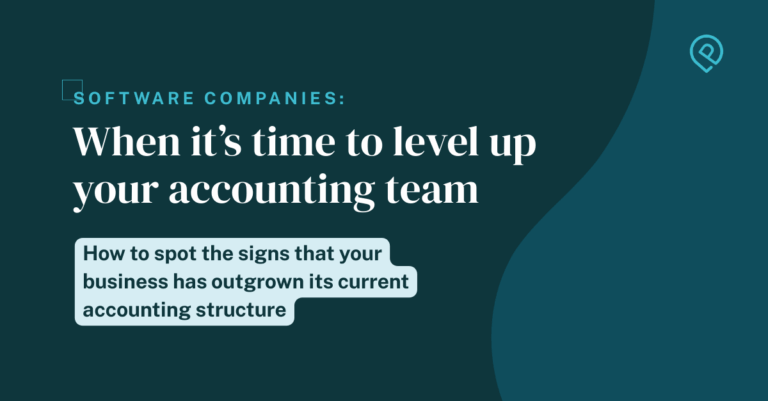How to spot the signs that your business has outgrown its current accounting structure
By Michael Breslin, Landing Point Co-Founder
For many growing software companies, early finance operations are built on a lean foundation:
- A bookkeeper or outsourced accounting firm
- A hands-on CFO or VP of Finance managing reporting alongside a dozen other things
- Basic financial systems cobbled together to get through the early days
It works — until it doesn’t.
As you scale, so does the complexity: ASC 606 compliance, investor reporting, multi-state payroll, SaaS metrics, revenue recognition policies, and audit readiness. At some point, leveling up your internal accounting team isn’t just smart — it’s necessary.
Here’s how to know it’s time to make a strategic hire, and what kinds of talent can help.
Signs You’ve Outgrown Your Current Accounting Setup
- Your month-end close is consistently delayed — and getting clean numbers feels like a heroic effort every time.
- Revenue recognition is getting more complex, but no one owns it deeply.
- Audit prep feels like starting from scratch every year.
- You’re expanding into new products, geographies, or business models without the internal accounting infrastructure to support it.
- Your CFO or Controller is buried in daily transactions instead of leading strategic finance initiatives.
Strategic Accounting Hires That Can Help
Depending on where you are in your journey, the right next hire might be:
#1: Controller
If you don’t have one yet — or your current structure is stretched thin — bringing on a Controller can immediately add rigor and process ownership. They should be able to:
- Own the close
- Implement and manage systems
- Lead audits
- Build revenue recognition policies aligned to ASC 606
#2: Senior Accountant / Revenue Accountant
If your Controller is solid but overwhelmed, a Senior Accountant or RevRec specialist can:
- Take ownership of daily accounting functions
- Manage reconciliations and support system migrations
- Dive into SaaS-specific revenue issues, customer contracts, and billing nuances
#3: Accounting Manager
For companies reaching the ~100+ employee mark, an Accounting Manager adds a middle layer of management to:
- Oversee daily accounting team operations
- Develop team workflows and improve close processes
- Interface between junior staff and leadership
Don’t Just Fill a Seat — Find the Right Skill Set
One mistake we often see is companies trying to get by with what they have or hiring narrowly for today’s needs instead of tomorrow’s challenges.
If you’re scaling, look for accounting talent that brings:
- Systems thinking: experience building processes, not just following them
- Industry relevance: SaaS, recurring revenue, multi-element arrangements
- A track record of handling audits, RevRec, and scaling reporting in fast-paced environments
And don’t be afraid to think creatively. Sometimes the perfect hire comes from an adjacent industry where they’ve managed equally complex revenue models — think biotech services, media, or telecom.
Ready to Level Up?
At Landing Point, we specialize in helping growing software companies in Boston and New England build accounting teams that can scale — whether you’re making your first critical hire or reinforcing your foundation for bigger growth ahead.
About Michael Breslin
Michael J. Breslin is a Co-Founder of Landing Point and leads the firm’s Boston office. With more than two decades of experience in executive search and finance leadership recruiting, he specializes in connecting accounting and finance professionals with opportunities in asset management, private equity, hedge funds, and software companies.
Michael’s work spans CFO, controller, and finance operations roles for mid-market and institutional investment firms throughout the Boston and Tri-State areas. Notable searches include the Global Controller for a multi-strategy investment platform and the Controller of a Boston-based global SaaS company.
Before founding Landing Point, Michael spent over a decade recruiting and three years with KPMG—an experience that provides the technical grounding and advisor credibility that clients trust. He holds a BA in Accounting from Fordham University, where he competed on the Division I swimming team. A Boston-based golfer, drummer, and youth soccer coach, Michael brings team focus and precision to every engagement.

